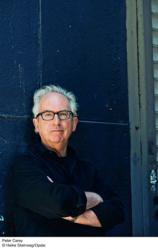His Illegal Self
Review
His Illegal Self
For
the portion of the United States population under the age of 30 or
so, the anti-war activism of the 1960s and ’70s probably
seems as remote as some obscure medieval conflict. In recent novels
like Dana Spiotta’s EAT THE DOCUMENT and Neil Gordon’s
THE COMPANY YOU KEEP, talented authors have given us glimpses of
that era in the form of middle-aged fugitive radicals who surface
in the present and now must come to terms with the consequences of
their youthful actions. Now, two-time Booker Prize winner Peter
Carey thrusts us into the heart of the era, with the profound and
moving story of a young boy and his protector forced to face those
circumstances in real time.
The year is 1972, the end of the Vietnam War almost three years
away and Richard Nixon, the President first elected on a cynical
promise to end it, on the verge of re-election. Seven-year-old
Ché David Selkirk, under the care of his maternal grandmother
after his radical activist parents are arrested following a violent
demonstration, divides his time between a luxury apartment on New
York’s Upper East Side and a rustic lakeside retreat in
upstate New York. His privileged, sheltered life changes abruptly
when a woman by the name of Anna Xenos, known only to Ché as
“Dial,” takes him one afternoon for what his
grandmother believes is a brief, clandestine reunion with his
mother. Instead, the outing turns into a trip across the United
States, shepherded and financed by members of “the
Movement,” from bus station to safehouse to motel and
ultimately to Queensland, Australia. Ché aches to be reunited
with his parents and fantasizes about the possibility that Dial, an
English professor and friend of his mother, may even be her.
Ché and Dial eventually land in a commune known as the Crystal
Community, where Dial has purchased 14 acres of desolate ground
populated by a handful of ramshackle structures and a group of
equally dubious inhabitants. Undermining the prototypical
“peace and love” ideology of the time, the
“hippies” are as suspicious and unwelcoming as any
middle-class suburbanites, even going so far as to demand Ché
and Dial rid themselves of Che’s kitten, Buck. In this
environment, Carey sketches with painstaking tenderness and care
the emotionally complex relationship between Dial and Ché ---
sometimes warm and more often tense and challenging ---
that’s at the heart of the novel.
At the commune, Ché is befriended by Trevor Dobbs (“a
strong man, sleek as a porpoise, sheathed in a good half-inch-thick
coat of fat which seemed to feed his brown, taut skin, giving it a
healthy fish-oil kind of shine”), a tough and oddly
compassionate character who becomes a father figure, teaching him
skills that will enable him to survive in the bush and imparting
both his rugged values and his barely contained paranoia about
those in authority.
The success of HIS ILLEGAL SELF rests on two pillars: Carey’s
acute insight into the mind of Ché, and the consistent
lyricism of writing that gives life to the harsh beauty of the
Australian landscape. Of the boy, finishing a gardening project for
Trevor that conjures up memories of lakeside summers with his
grandmother, he writes: “Then he did cry, secretly, mourning
everything he lost, all the cold empty hollows, the marrow stolen
from his bones.” And, in one of the countless arresting
examples of his keenly observant prose, the author pictures for us
“the inky green of rain forest where arm-thick vines wound
around trees with skins like elephants. Beyond the hut, behind the
car, the lonely darkness was bleeding along the course of Remus
Creek and washing up into the muggy hills.”
When Trevor and Dial enlist an Australian lawyer of questionable
competence in a plan to return Ché to his grandmother, the
life they’ve been living in the rugged wilderness begins to
unravel. As befits a novel of this maturity and power, HIS ILLEGAL
SELF doesn’t falter by trying to bring the story to a close
in any kind of tidy fashion. The ending is as fitting as it is
startling, all the more satisfying because of the careful
craftsmanship that leads up to it.
In an interview on the occasion of the publication of his last
novel, Carey said that he’s motivated by “the thought
that one might actually make something very beautiful, that had
never existed before.” By that standard he has more than
satisfied his goal in this rich and complex work.
Reviewed by Harvey Freedenberg ([email protected]) on January 22, 2011
His Illegal Self
- Publication Date: February 5, 2008
- Genres: Fiction
- Hardcover: 288 pages
- Publisher: Knopf
- ISBN-10: 030726372X
- ISBN-13: 9780307263728











